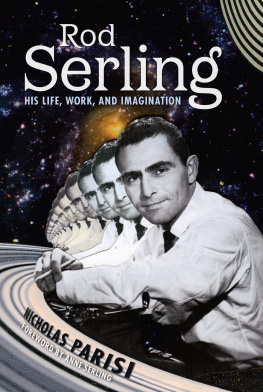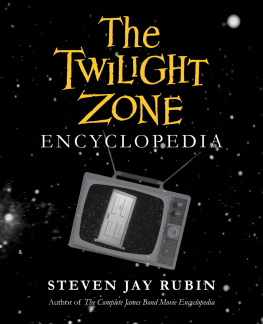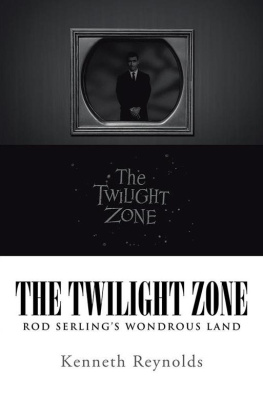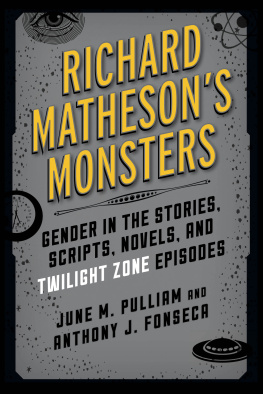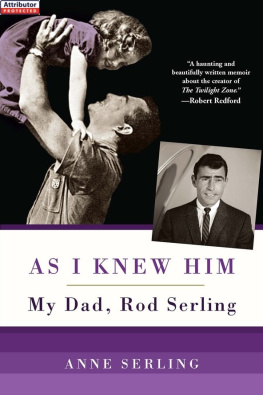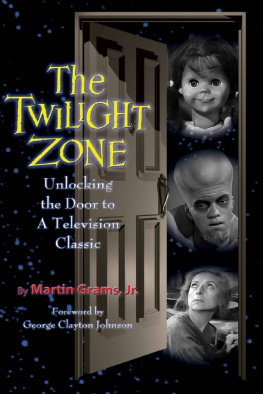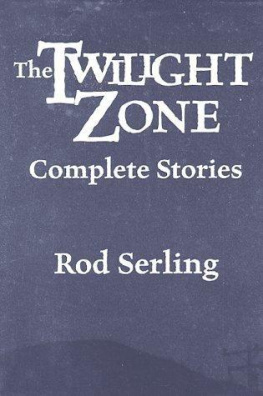
Published by Barricade Books Inc.
185 Bridge Plaza North
Suite 308-A
Fort Lee, NJ 07024
www.barricadebooks.com
Copyright 2009 by Douglas Brode and Carol Serling.
All Rights Reserved.
NOTE: Photographic stills that appear in this book are drawn from the personal collection of Carol Serling. They are reprinted here with full permission of the Rod Serling estate.
Photos appear courtesy of CBS Broadcasting, Inc.
No part of this book may be reproduced, stored in a retrieval system, or transmitted in any form, by any means, including mechanical, electronic, photocopying, recording, or otherwise, without the prior written permission of the publisher, except by a reviewer who wishes to quote brief passages in connection with a review written for inclusion in a magazine, newspaper, or broadcast.
Library of Congress Cataloging-in-Publication Data A copy of this titles Library of Congress Cataloging-in-Publication Data is available on request from the Library of Congress.
ISBN 13: 978-1-56980-358-5
ISBN 1-56980-358-7
10 9 8 7 6 5 4 3 2 1
Manufactured in the United States of America
To the Memory of Rod Serling
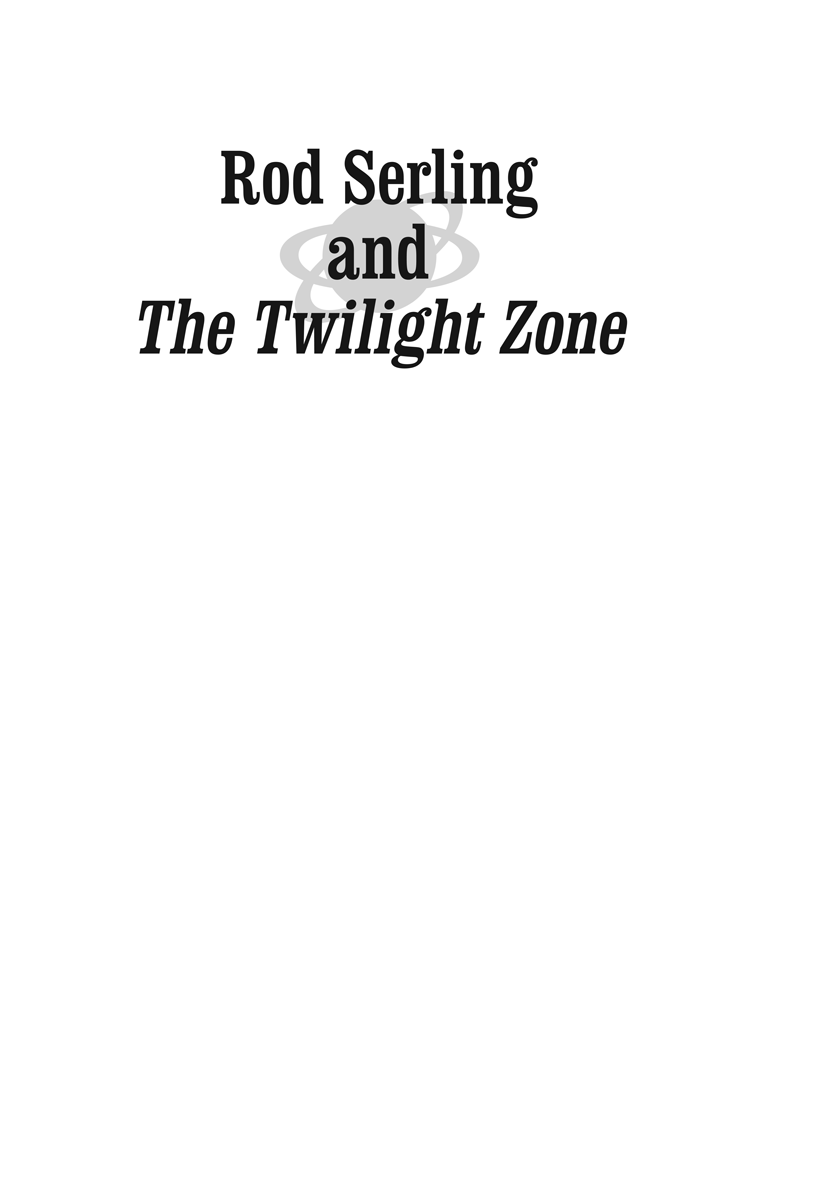

Foreword
by Carol Serling
Man consists of body, mind and imagination.
His body is faulty
His mind untrustworthy,
But his imagination has made him remarkable.
John Masefield
S UBMITTED FOR YOUR approval, as Rod would have said, HERE is a book that for the first time goes behind the TV cameras to dissect and examine the mysterious, provocative, seductively terrifying stories that make up the body of The Twilight Zone world.
If you watched The Twilight Zone as a child, you might have been thoroughly frightened, though in actuality only a few of the programs were intended to scare. If you were a teenager back then, you might have enjoyed the fables as electronic-age campfire folktales. Now, as an adult, its likely that you have learned that the stories can be viewed on many different levels. Entertainment? Yes. But enlightenment, too. For there is a morality to those episodes; a message, if you will. And that is what this book is all about.
Through parable and suggestion, Rod commented on the state of the world and mans eternal search for self. He often wrote of the dread of the unknown, the loss of identity, and the subtle destruction of human freedoms. But there were stories, too, that dealt with the dignity of man, his treatment of his fellows, his need for commitment, and the importance of love.
The TV sponsors and network bigwigs didnt wield the black pencil of censorship because they either failed to understand what Rod was saying or just figured that he was off somewhere in outer space. But in truth, Rod was writing about the problems and issues of the day. Think of The Twilight Zone , then, as a thinly veiled call to public consciousness. Strange, but unfortunately true, the issues we encountered back then are not so very different from those we face fifty years later. Perhaps that partly explains the shows continued relevance over the past half century.
The Twilight Zone continues to thrill audiences decades after it first aired on television in the late 1950s and early 1960s. No other television series has surpassed The Twilight Zone for sheer excitement and wealth of ideas. Those original 156 episodes still play in reruns around the world, proof of the power and timelessness of intelligent stories well told. Individual episodes deal with all aspects of the human condition, past, present and future, and are as varied as mans dreams and fears. But all reveal a deep concern for taste and adult sensibilities.
I know that Rod would approve of Douglas Brodes remarkable book and the insight that he offers into Rods work. The Twilight Zone lives on in the twenty-first century and will entertain and provoke as long as the art of storytelling exists.
I hope that you enjoy your journey through these pages.
Carol Kramer Serling
September 25, 2008

INTRODUCTION:
THE WORLD ACCORDING TO ROD
I DONT HAVE THE imagination most writers have, Rod Serling once claimed. Anyone hunting for proof that the worst place to go for an understanding of an author is his own words need look no further! Zone s still-potent stories attest to Serlings stellar reputation as the most imaginative of all American writers since Edgar Allan Poe. So... was Serling merely being humble? Did he fail to grasp the full enormity of his gift? Might he have hoped that his non-fantasy work, Patterns (1955) and Requiem for a Heavyweight (1956) most notable among them, might be more vividly recalled if he downplayed his contribution to the under-appreciated imaginative-fantasy genre? Likely, Serlings words derived from a combination of all the above. And, truth be told, other elements that tormented this deeply conflicted man.
On other subjects, Rod spoke truthfully and fearlessly. One early observer of TV hailed him as the mediums angry young man. The only other contender: Edward R. Murrow, whose interview show followed Zone on Friday nights (19591960). What Murrow achieved in CBSs newsroom integrity! Serling pulled off at that networks entertainment arm.
Earlier in the decade, Serling and other top talents openly addressed important issues during TVs brief golden age. Colleagues included Reginald Rose ( Twelve Angry Men ), Paddy Chayefsky ( Marty ), and J. P. Miller ( The Days of Wine and Roses ). All turned out smart scripts for live anthologies that dominated TV drama from 1948 to 1955. Then the price of sets lowered and TV became big business for mass entertainment. Serious drama was out; predictable potboilers were in. From that point on, Serling necessarily presented politics and philosophy in a foxier manner. Yet present them he did, initially as a haunting off-screen voice. Then, beginning with the first show of Zone s second season (Fall 1960), he spoke directly into the camera. Eyeballing the audience, Serling charmed the nation with his charismatic presence, uniquely alliterative way with words, and the ideas, largely of a liberal-progressive order, he so deeply believed in.
Casting a seductive smile, Serling alone continued to convey on TV what every other serious writer wanted to say but wasnt allowed to. High-profile sponsors now acted as self-appointed censors, making certain that their products were presented in a context that offended no one. So Serling said something by doing so indirectly, dropping confrontational realism for parable. During The Twilight Zone s five-year run (19591964), he employed imaginative/allegorical fiction to comment on (and sharply criticize) postwar America. On Zone , Peter Kaplan claimed, the nightmare side of American life was opened up. What initially seemed to be out-of-this-world dreams of darkness reflected a shadow-world existing on the edge of our brightly lit suburbs.
But where did such a politicized view of drama come from? Serlings early surroundings appear unlikely to lead to an intellectual approach. Born on December 25, 1924, young Rod (age two) moved with his family (parents Sam and Esther; older brother Robert) from Syracuse, New York to the smaller city of Binghamton. As a child growing up in a provincial area, Rod remained blissfully unaware of John Steinbeck or Clifford Odets, the eras great realists. Upstaters might have the opportunity to catch an occasional touring company, but Manhattans live theatre of ideas was not easily accessible. Movies had emerged as an average Americans source of drama and comedy. An avid fan, Rod memorized dialogue from his favorite film, Adventures of Robin Hood (1936), then performed the story for family and friends. Likewise, he enjoyed Flash Gordon and Buck Rogers .
Next page

